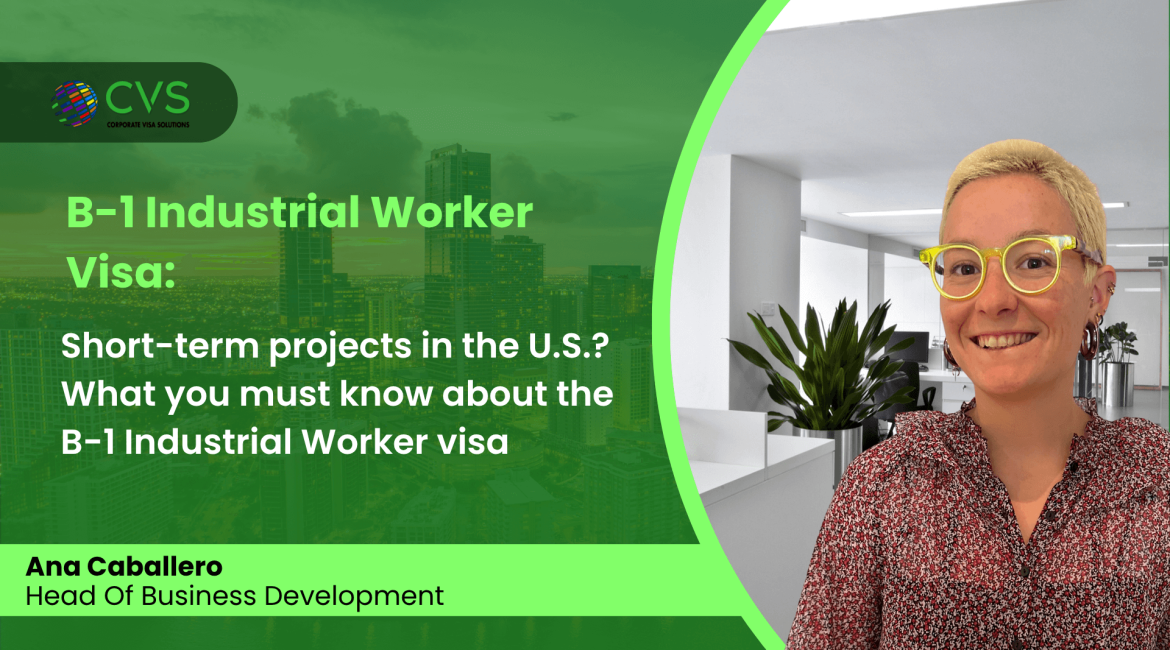When companies need to send foreign technicians or specialists to the U.S. for a limited period, selecting the right visa is key. For very specific technical assignments that are short in duration and tied to equipment or service contracts, the B-1 industrial worker visa offers a compliant and efficient solution — without the complexity of a traditional work visa.
This article explains what the visa allows, when to use it, and how it compares to other short-term options for project-based work in the U.S.
What is the B-1 Industrial Worker visa?
The B-1 industrial worker visa is a subcategory of the B-1 Business Visitor visa, which allows foreign nationals to enter the U.S. temporarily for certain business-related purposes. In this particular case, it applies to industrial workers, technicians, or engineers who are needed in the U.S. to:
- Install, service, or repair equipment or machinery sold by a foreign company;
- Train U.S.-based staff on the use of that equipment;
- Perform technical tasks under a contract related to goods or services already provided.
According to the U.S. Department of State’s Foreign Affairs Manual (FAM 9 FAM 402.2-5(C)), such workers must remain employed and paid by the foreign entity and cannot perform productive work that would displace or replace a U.S. worker.
This visa category is not a work visa, but a narrowly defined allowance within the B-1 framework for specific, prearranged technical tasks.
When to consider it for short-term projects USA
If your company is managing short-term projects USA involving the delivery or setup of machinery, complex systems, or software solutions, this visa may be the most practical legal pathway for your technicians.
Typical use cases include:
- Turnkey industrial installations;
- Technical training post-sale;
- Equipment calibration and support;
- Urgent repairs under warranty agreements.
It is important to note that the visa does not allow hands-on construction work or manual labor unrelated to the purchased product. Any deviation from the permitted activities can result in denial of entry or visa revocation.
For companies managing multiple clients in the U.S., it is critical to assess each case and document the link between the technical visit and the commercial transaction that justifies it. Learn more about other available U.S. visa options for foreign professionals in case a different category is more appropriate.
How it differs from other temporary assignment visa USA options
The B-1 industrial worker visa stands apart from other temporary assignment visa USA categories due to its limited scope, faster processing, and minimal paperwork. Here are the key differences:
Visa Type | Duration | Requires USCIS Petition? | Permits U.S. Salary? | Typical Use Case |
|---|---|---|---|---|
B-1 Industrial Worker | Up to 6 months | ❌ | ❌ | Equipment installation |
L-1B Intracompany Transferee | Up to 5 years | ✅ | ✅ | Company transfers |
H-1B Specialty Occupation | Up to 6 years | ✅(and cap-subject) | ✅ | Long-term employment |
The B-1 route is particularly useful when the technical tasks in the U.S. are short-term, well-documented, and directly tied to a sale or service agreement.
When the project requires broader or longer-term involvement, employers may consider other categories such as the B-1 in lieu of H-1B, which allows some professionals to technical assistance in the U.S. under stricter criteria.
Documentation and compliance: what your company must prepare
Although the B-1 industrial worker visa does not require a USCIS petition, it does require strong supporting documentation to prove eligibility at the time of the consular interview and at the port of entry. This usually includes:
- A letter from the foreign employer describing the technician’s role, purpose of the trip, and confirming that the individual remains on foreign payroll;
- A contract or purchase agreement between the foreign company and the U.S. client;
- A letter of invitation from the U.S.-based entity confirming the need for the technician’s services;
- Failure to prepare this documentation properly can lead to visa denial or refusal of entry at the U.S. border.
You can review a detailed example of how this category works on our page about technical worker visa cases under B-1.
Conclusion
The B-1 industrial worker visa is a valuable tool for global companies managing technical obligations in the U.S. tied to sales or service agreements. For short-term projects in the USA that require temporary deployment without a long-term presence, this category offers speed, compliance, and predictability — when properly handled.
If your company is considering a temporary U.S. visa for technical staff, make sure to assess the nature of the work, the documentation required, and the visa officer’s likely interpretation of the case. At Corporate Visa Solutions, we specialize in supporting businesses with tailored visa strategies to meet tight project deadlines while staying fully compliant.
Looking to explore more strategic U.S. visa options? Take a look at these related insights:


